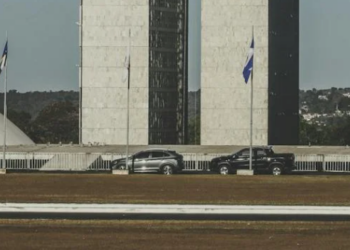by PublicABCP
Translated and reviewed by Matheus Lucas Hebling
The article Political Violence Against Women from an Intersectional Perspective: Minas Gerais as a Theoretical and Practical Locus for Understanding the Phenomenon, published in volume 23 of Revista Terceiro Milênio, is authored by Marlise Matos (UFMG), Viviane Gonçalves Freitas (UFMG), and Ester Monteiro (UFMG). The research, developed within the Center for Studies and Research on Women (Nepem/UFMG), examines the escalation of political violence against women in Minas Gerais, within the broader context of growing autocratization in Brazil and globally.
The main objective of the article is to understand and denounce political violence against women from an intersectional perspective, highlighting the case of Minas Gerais — the first Brazilian state to enact specific legislation on the matter. Law No. 24.466/2023 established the Program for Combating Harassment and Political Violence Against Women. The study seeks to expose the multiple dimensions of gendered political violence, situating it within a context of democratic backsliding and authoritarian resurgence.
The research draws on testimonies from five female legislators from Minas Gerais who suffered threats and episodes of political violence in 2023. It also analyzes regional news reports published by outlets such as O Tempo and Estado de Minas, along with data from the Observatory of Political and Electoral Violence (OVPE/UniRio). Using a qualitative methodology, the study centers on the parliamentarians’ narratives and the sociopolitical dynamics shaping these experiences.
Findings reveal that political violence against women has intensified in the current political context, particularly in Minas Gerais, where threats and attacks are frequent and disproportionately target Black and left-wing women. The research notes that while the criminalization of political violence represents a legal step forward, significant obstacles remain in the practical enforcement of public protection policies.
The absence of a consolidated protocol for reporting and addressing cases prevents coordinated action among different levels of government, exacerbating the vulnerability of women engaged in institutional politics. The authors emphasize that political violence against women functions as a mechanism of exclusion and control, aiming to delegitimize female participation in spaces historically dominated by men.
The study concludes that political violence against women constitutes a direct threat to the Democratic Rule of Law and to the political gains achieved by women over recent decades. Addressing the issue requires an intersectional approach that accounts for gender, race, social class, and political orientation. Moreover, the establishment of clear, integrated protocols for victim support, reporting, and protection is urgent to ensure that the law does not remain merely symbolic.
Author Profiles
Marlise Matos holds a PhD in Sociology and is an Associate Professor in the Department of Political Science at the Federal University of Minas Gerais (UFMG). She coordinates the Center for Studies and Research on Women (Nepem).
Viviane Gonçalves Freitas holds a PhD in Political Science and serves as coordinator (2024–2026) of the Race, Ethnicity, and Politics Research Area of the Brazilian Political Science Association (ABCP).
Ester Monteiro is an undergraduate student in Social Sciences at UFMG and a research fellow at the Center for Studies and Research on Women (Nepem).
Technical Information
Title: Political Violence Against Women from an Intersectional Perspective (VPCMI): Minas Gerais as a Theoretical and Practical Locus for Understanding the Phenomenon
Authors: Marlise Matos, Viviane Gonçalves Freitas, and Ester Monteiro
Publication Date: December 6, 2024
Published in: Revista Terceiro Milênio, vol. 23








